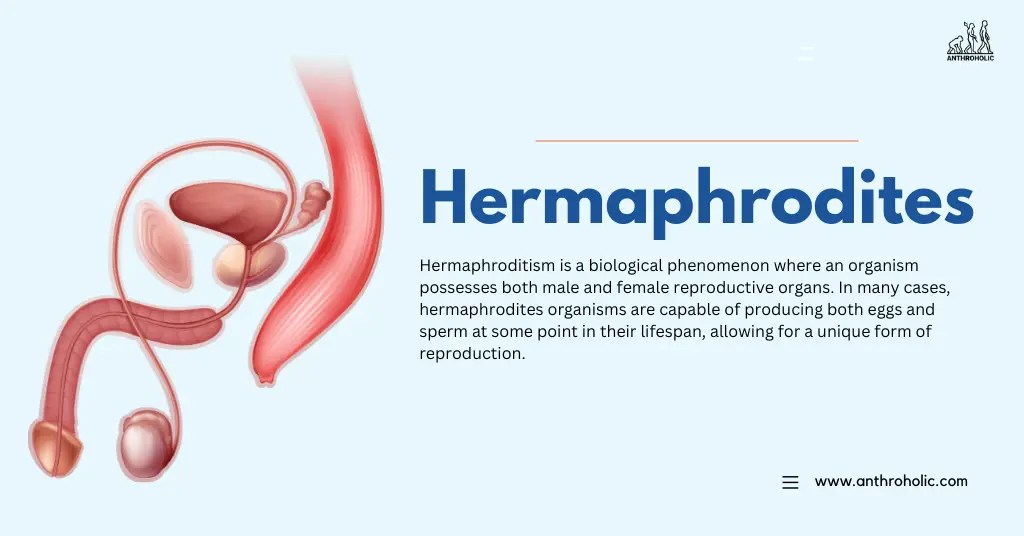Male and female hermaphrodites, also known as intersex individuals, offer a fascinating glimpse into the complexity of human biology and gender identity. This article delves into the world of hermaphroditism in humans, exploring notable examples, the science behind intersex conditions, and the social implications surrounding them. Through expert insights and credible sources, we aim to provide a thorough understanding of this often-misunderstood topic.
Intersex individuals are born with physical sex characteristics that do not fit typical binary notions of male or female bodies. These variations can manifest in genitals, chromosomes, or hormone levels, leading to a wide spectrum of intersex traits. The study of hermaphroditism not only highlights the biological diversity of humans but also raises important discussions about gender identity, societal norms, and the rights of intersex people.
As we navigate through this article, we will cover various aspects of hermaphroditism, including definitions, biological mechanisms, historical examples, and the challenges faced by intersex individuals today. By the end of this exploration, readers will gain a deeper appreciation for the complexity of human sexuality and the importance of inclusivity in our understanding of gender.
Table of Contents
- Definition of Hermaphroditism
- Biological Mechanisms of Hermaphroditism
- Notable Examples of Male and Female Hermaphrodites
- Historical Context of Hermaphroditism
- Social Implications and Challenges
- Medical Aspects of Intersex Conditions
- Advocacy and Rights of Intersex Individuals
- Conclusion
Definition of Hermaphroditism
Hermaphroditism refers to the condition where an individual possesses both male and female reproductive organs or characteristics. In humans, this condition is often referred to as intersex. It is important to note that intersex is an umbrella term that encompasses a variety of conditions, including:
- Androgen Insensitivity Syndrome (AIS)
- Congenital Adrenal Hyperplasia (CAH)
- Turner Syndrome
- Klinefelter Syndrome
The presence of intersex traits can be identified at birth, during puberty, or even later in life, depending on the specific condition and its characteristics.
Biological Mechanisms of Hermaphroditism
The biological mechanisms that lead to hermaphroditism involve complex interactions between genetics, hormones, and environmental factors. Some key points include:
- Genetics: Chromosomal variations can lead to intersex conditions, such as the presence of an atypical number of sex chromosomes (e.g., XXY in Klinefelter Syndrome).
- Hormonal Influences: Hormonal imbalances during fetal development can result in the development of ambiguous genitalia or other intersex traits.
- Environmental Factors: Exposure to certain environmental factors or endocrine disruptors may influence sexual development.
Understanding these biological mechanisms is crucial for medical professionals and researchers in developing appropriate care and support for intersex individuals.
Notable Examples of Male and Female Hermaphrodites
Throughout history, there have been notable individuals known to exhibit intersex traits. Some prominent examples include:
| Name | Condition | Notable Facts |
|---|---|---|
| Christine Jorgensen | Gender Dysphoria/Intersex | One of the first Americans to undergo sex reassignment surgery and became a prominent advocate for transgender rights. |
| Thomas Beatie | Intersex | Known as the "Pregnant Man," Beatie gained media attention for being one of the first publicly known transgender men to become pregnant. |
| Hanne Gaby Odiele | Congenital Adrenal Hyperplasia | A Belgian model who has been open about her intersex condition and advocates for intersex rights. |
Historical Context of Hermaphroditism
The understanding of hermaphroditism has evolved significantly over time. In ancient cultures, intersex individuals were often viewed through various lenses, including:
- Mythology: Many cultures had myths and stories featuring hermaphroditic deities, symbolizing the union of male and female.
- Medicine: Historically, intersex conditions were often misunderstood, leading to controversial medical practices, including forced surgeries.
- Legal Recognition: In recent years, some countries have begun to recognize intersex individuals legally, allowing for non-binary gender markers on identification documents.
Social Implications and Challenges
Intersex individuals often face social challenges due to societal norms surrounding gender. Some common issues include:
- Stigmatization: Intersex individuals may face discrimination and stigma, leading to mental health challenges.
- Medical Interventions: Many intersex individuals have undergone non-consensual surgeries in infancy, raising ethical concerns.
- Awareness and Education: There is a general lack of awareness and education about intersex conditions, which can contribute to misunderstanding and prejudice.
Medical Aspects of Intersex Conditions
Medical approaches to intersex conditions have been evolving, with an increasing focus on informed consent and patient autonomy. Key considerations include:
- Holistic Care: Medical professionals should adopt a holistic approach that considers the psychological, emotional, and physical aspects of care.
- Informed Consent: It is crucial to involve intersex individuals in decisions regarding their medical treatment and interventions.
- Support Systems: Providing access to support groups and resources can greatly benefit intersex individuals and their families.
Advocacy and Rights of Intersex Individuals
Advocacy for intersex rights has gained momentum in recent years, with organizations working to promote awareness and support. Some key advocacy points include:
- Legal Protections: Calls for legal protections against discrimination based on intersex status.
- Education and Awareness: Initiatives to educate the public about intersex issues to reduce stigma.
- Policy Change: Advocating for policy changes to ensure informed consent and the right to bodily autonomy for intersex individuals.
Conclusion
Male and female hermaphrodites, or intersex individuals, represent a vital aspect of human diversity that warrants respect and understanding. As we have explored, intersex conditions are rooted in complex biological mechanisms and have significant social implications. By advocating for the rights of intersex individuals and fostering awareness, we can create a more inclusive society that recognizes and values all forms of human identity.
We encourage readers to engage in discussions, share their thoughts in the comments, or explore more articles related to gender diversity and human biology. Together, we can contribute to a more informed and compassionate world.
Thank you for reading, and we hope to see you back on our site for more insightful articles.


